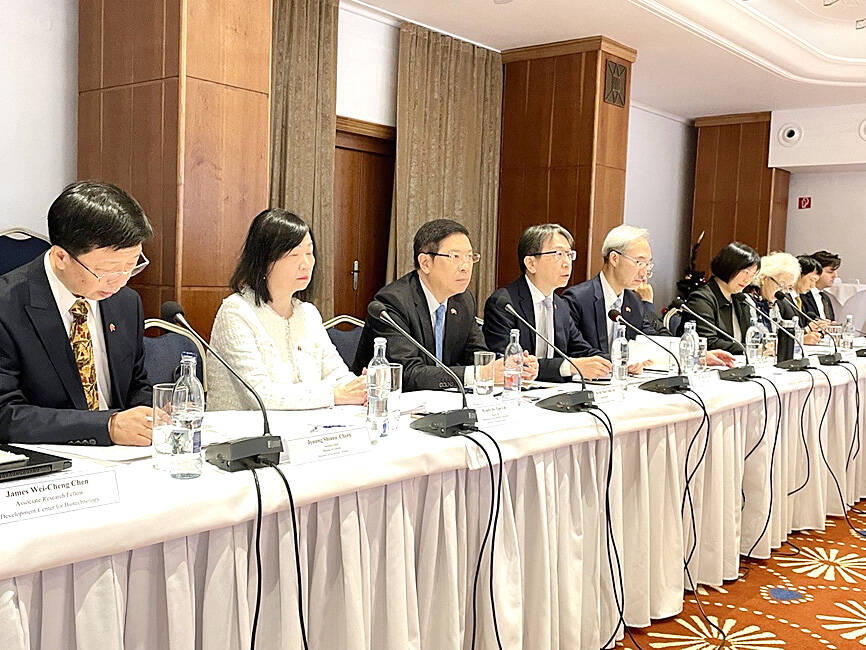Taiwan and Slovakia on Friday signed three memorandums of understanding (MOUs), pledging to boost bilateral trade, exchanges between start-ups and collaborations on nurturing talent for the semiconductor sector.
The memorandums were signed between the Importers and Exporters Association of Taipei and the Council of Slovak Exporters; Taiwan’s Startup Terrace and Slovak Business Agency; and National Sun Yat-sen University and the Slovak University of Technology in Bratislava.
The signing in Bratislava was part of the second session of the Taiwanese-Slovak Commission on Economic Cooperation attended by a Taiwanese delegation led by Deputy Minister of Foreign Affairs Tsai Ming-yen (蔡明彥).

Photo: CNA
During the session, Tsai and Slovak State Secretary of the Ministry of the Economy Peter Gerhart exchanged ideas on how to boost bilateral trade and economic cooperation.
Taiwan and Slovakia have seen warming relations over the past few years, and the two sides hope to expand their collaborations on semiconductors, electric vehicles and the space industry, Tsai said.
He invited Slovak officials to attend next year’s session of the commission in Taiwan.
Other topics discussed on Friday included renewable energy, biotechnology, and space and science programs, he said.
The two sides agreed to continue to consolidate their substantial partnership, he said.
The Taiwanese delegation comprised representatives from the Ministry of Economic Affairs, the Bureau of Energy, the National Science and Technology Council and the partly government-funded Development Center for Biotechnology.
The Slovak delegation consisted of representatives from the Slovak Ministry of the Economy, the Slovak Ministry of Foreign and European Affairs, the Slovak Investment and Trade Development Agency, the Slovak Academy of Sciences and the Slovak Ministry of Education, Science, Research and Sport.
Then-Slovak State Secretary of the Ministry of the Economy Karol Galek led a delegation to Taipei in December last year for the first session of the commission.

NEW IDENTITY: Known for its software, India has expanded into hardware, with its semiconductor industry growing from US$38bn in 2023 to US$45bn to US$50bn India on Saturday inaugurated its first semiconductor assembly and test facility, a milestone in the government’s push to reduce dependence on foreign chipmakers and stake a claim in a sector dominated by China. Indian Prime Minister Narendra Modi opened US firm Micron Technology Inc’s semiconductor assembly, test and packaging unit in his home state of Gujarat, hailing the “dawn of a new era” for India’s technology ambitions. “When young Indians look back in the future, they will see this decade as the turning point in our tech future,” Modi told the event, which was broadcast on his YouTube channel. The plant would convert

‘SEISMIC SHIFT’: The researcher forecast there would be about 1.1 billion mobile shipments this year, down from 1.26 billion the prior year and erasing years of gains The global smartphone market is expected to contract 12.9 percent this year due to the unprecedented memorychip shortage, marking “a crisis like no other,” researcher International Data Corp (IDC) said. The new forecast, a dramatic revision down from earlier estimates, gives the latest accounting of the ongoing memory crunch that is affecting every corner of the electronics industry. The demand for advanced memory to power artificial intelligence (AI) tasks has drained global supply until well into next year and jeopardizes the business model of many smartphone makers. IDC forecast about 1.1 billion mobile shipments this year, down from 1.26 billion the prior

People stand in a Pokemon store in Tokyo on Thursday. One of the world highest-grossing franchises is celebrated its 30th anniversary yesterday.

Zimbabwe’s ban on raw lithium exports is forcing Chinese miners to rethink their strategy, speeding up plans to process the metal locally instead of shipping it to China’s vast rechargeable battery industry. The country is Africa’s largest lithium producer and has one of the world’s largest reserves, according to the US Geological Survey (USGS). Zimbabwe already banned the export of lithium ore in 2022 and last year announced it would halt exports of lithium concentrates from January next year. However, on Wednesday it imposed the ban with immediate effect, leaving unclear what the lithium mining sector would do in the